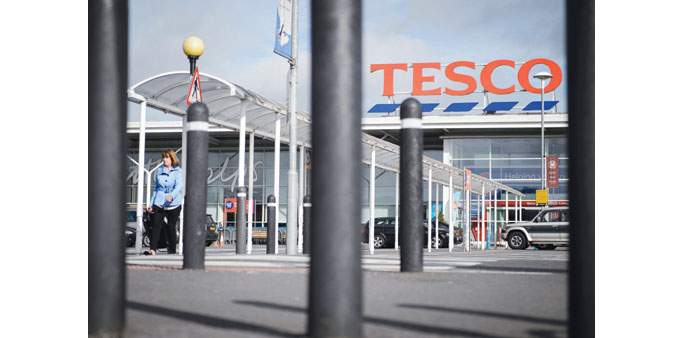Reuters
Tesco will slash its dividend and investment spending to give its new boss more firepower to rebuild Britain’s biggest retailer, after a second profit warning in two months showed the scale of the task he faces.
The grocer said that as a result of its worsening performance, former Unilever turnaround specialist Dave Lewis would start on Monday – a month earlier than planned – with a remit for a major review of the 95-year-old business.
The latest profit warning lays bare the need for a change at a company once considered an unstoppable engine of growth, with annual trading profit now expected to come in around 25% lower than last year – a third straight year of decline.
Analysts said the 75% cut in the half-year dividend to 1.16 pence per share was much deeper than expected, but it would give Lewis greater flexibility to revive the world’s No.3 retailer, such as by cutting prices.
Shares in Tesco, which have been languishing near a 10-year low, slumped 6% to wipe around 1.2bn pounds off its market valuation. An initial fall of 8.5% was its greatest single drop in two and a half years.
“We are not expecting a quick turnaround,” said Niall Dineen, a portfolio manager at AGF International Advisors, who increased his holding in Tesco on Friday morning.
“We think it will be a couple of years for margins to recover and we think the share price could be under pressure for a while.” Rival Sainsbury’s fell 4.5% and Morrisons dropped 4% on fears that Lewis could plough cash into slashing prices and spark an industry-wide battle.
“We see this as “clearing the air” ahead of a strategy reset involving a significant reduction in pricing and, potentially, further asset disposals outside the UK,” Standard & Poor’s analyst Carl Short said.
Tesco has been hit by fierce competition from discounters at the lower end of the market as well as by rivals at the top, and by changing British shopping habits. The big out-of-town stores it long championed are now less in demand, with more people preferring to shop little and often at local stores or buy online. Costly mistakes abroad, such as a failed US venture, have also taken their toll on TesCo. Britain’s largest private sector employer, with over 500,000 staff, started losing ground in its key home market in the latter years of CEO Terry Leahy’s tenure, after he had transformed the company into the clear market leader.
His successor Philip Clarke, who spent more than 1bn pounds on a failed recovery plan, issued his first profit warning in January 2012, and another in July as he quit.
With industry data showing Tesco’s UK market share continuing to slide at an alarming rate, the company turned to Lewis as its first external CEO appointment in its history.
“The board’s priority is to improve the performance of the group,” Chairman Richard Broadbent said.
“Our new Chief Executive, Dave Lewis, will now be joining the business on Monday and will be reviewing every aspect of the group’s operations. This will include consideration of all options that create value for customers and shareholders.”
Data on Wednesday showed Tesco’s sales decline had worsened, hurt by the weakest overall market growth in a decade, with its sales down 4.0% year on year in the 12 weeks to August 17.
Its market share has dipped to 28.8% from the 30.7% it held when Clarke took over in March 2011, as it lost ground both to discounters Aldi and Lidl and upmarket grocers such as Waitrose. Rivals Sainsbury’s and Wal-Mart’s Asda have remained largely stable while Morrisons, the country’s fourth largest player, has also struggled.
The cut to the interim dividend, which analysts estimate could save Tesco 800-900mn pounds assuming a similar cut to the final dividend, and the 400mn pound reduction in capital spending on IT and store revamps will give Lewis greater financial firepower to cut prices and win back shoppers.
Other more radical options open to the new boss include a shake-up of Tesco’s store structure to create different formats for different areas, including a chain to compete with discounters, one to target the mid-market and a third to challenge the upmarket sector.
Its brand and image could also be revamped, costs and staffing numbers could be cut.
“Dave is really keen to get started and the board recognised the need to get on and address these challenges,” a source familiar with the situation told Reuters. Clarke, a 40-year Tesco veteran, will remain on hand to help with the transition through to January.
Analysts at Shore Capital said the rest of the company’s management also needed an overhaul, a view echoed by ex-Tesco directors speaking to Reuters earlier this month.
“This update fundamentally raises questions in our minds about the capability of the management under Clarke at this once great company... We expect ... there to be considerable senior management change under Lewis in time,” the analysts said.

